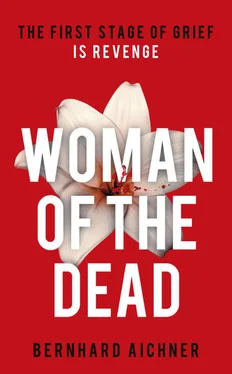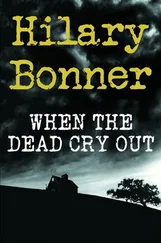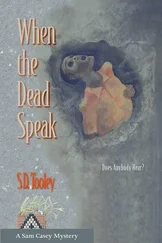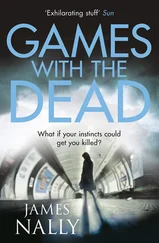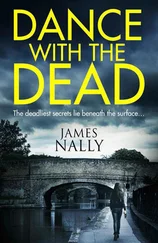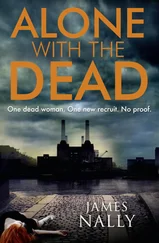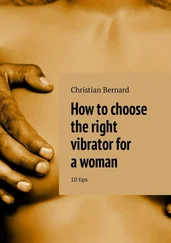‘I was always afraid for him.’
‘He did as he wanted.’
‘He was a good boy.’
‘More than that, Karl.’
‘We’ll get through this, Blum.’
‘Yes.’
They sit in silence. Karl takes Blum’s hand and holds it firmly. Nothing exists but their hands, the children and the motorbike. A summer’s day in the garden. They have said all they need to say, Karl and Blum. There is understanding and affection between them. Blum likes him; she has never regretted asking Karl to come and live with them. He is like a benevolent household spirit. A household spirit resuming his duties. Karl is back, he won’t creep away again; he says he has missed the children and wants to go on living, even if it hurts. Wants to go on living, like Blum, go on pushing the swing back and forth.
Blum doesn’t wear a helmet. She puts the key in the ignition and presses the button. The Monster purrs. She waves to the children and accelerates out through the gateway and into the road, without glancing in the direction the Rover came from. She accelerates. Blum with the wind in her face, with flies in her face. She simply turns the handlebars and feels what happens. How fast she is going. Down the road of houses and on to the autobahn, eyes narrowed, seeing only a slice of the world flying past. She shifts gear, she steps on the gas. Never mind what happens, never mind where she is going. There’s only Blum and the road.
She hasn’t ridden a motorbike since she passed her test. A girl she knew at school died in a crash soon after taking the test herself. Dead, just like that, exactly how Mark died. That fear has accompanied her until now. Whenever Mark wanted her to ride with him she said no; she was afraid of dying. But now she is tearing down the autobahn without leathers, without a helmet, with nothing to protect her except her exuberance, her thoughtlessness, her closeness to death itself, her longing to be with him. She is riding at one hundred and ninety kilometres per hour, with tiny creatures sticking to her skin, her face pricked by needles. Ride on faster, two hundred and twenty kilometres per hour. Overtake, hear the sound of the engine, go on and on. Breathe. Die.
Blum wanted to understand him. Why he liked and needed that sense of speed. She wondered why he was prepared to die. Every time he accelerated, every time he broke the speed limit, he must have felt he was flying. But he had a family, children, love. A moment would have been enough, a brief moment of inattention. I love it , he said. It’s like a song, like dancing, like champagne. You must try it, Blum, just once. I’ll look after you. He’d been trying to persuade her for years to get on the bike and share that sensation with him. She’d said no for so long. Now she has felt what he felt. It was like falling, like nothing else mattered, nothing existed but herself.
She has been riding for an hour. No one has stopped her; no police, no speed camera. She has been gambling with her life for an hour, has imagined her head striking the central reservation, crashing into the windscreen of an oncoming vehicle. She pictured her death as she rode. She died in full colour, and came home uninjured. The world is in order. Karl is putting the girls to bed, Reza is unloading a body from the van.
‘Thank you, Reza.’
‘You don’t have to say that.’
‘Yes, I do, Reza. Nothing here would work without you.’
‘It’s all right.’
‘Who do you have there?’
‘A woman from the care home. We had to carry her out through the kitchen.’
‘Why through the kitchen?’
‘They didn’t want the other inmates to see that someone had died.’
‘Inmates?’
‘Residents.’
‘Why through the kitchen, for God’s sake?’
‘Because they didn’t want to remind the inmates that their days are numbered too.’
‘We agreed on residents , right?’
‘That’s fine by me.’
‘Her family?’
‘Coming tomorrow. They want to see her one last time. The grave’s booked, the funeral’s organised.’
‘Reza, you’re the best. If you need more help, just say so.’
‘Everything’s fine.’
‘Is it really?’
‘Well, no.’
‘You don’t talk about how you’re feeling.’
‘Mark was my friend. It’s like a cake without candles.’
‘A cake?’
‘Mark was the candle on the cake.’
‘I know.’
‘He was just blown out.’
‘I know. It’s dark without him. But today Karl said that we’ll get through this.’
‘Did he? That’s good. Very good.’
‘We will, Reza. We’ll get through it together, you, Karl, the girls and me.’
‘Yes.’
‘It will get better.’
‘When?’
‘Soon, Reza, soon.’
Blum goes upstairs. She almost believes it herself; for a moment something positive flares in her, something like hope. Riding the motorbike was an intoxicating sensation. She has survived, she has felt what he felt, she has challenged her fate. She knows she is meant to live not die. The decision has come down in favour of life, of the children, of everything that hasn’t happened yet. And in favour of Dunya. She is going to find out what happened, find out about that woman and what terrifies her so much. Blum wants to know; something tells her that it is important, that it is not delusion but truth. Mark believed that, so she believes it too. He wanted to help the woman, and so does she. She has no alternative, she has heard what happened to Dunya, and she can’t pretend that it didn’t. She pressed Play. There’s nothing else she can do; she will listen to everything again. She looks in on the children, lies down with them for a little while, kisses them and disappears into his study.
She sits in his chair, the telephone in her hand, listening to that incredible story. The abduction of three people, rape, imprisonment, horror for years on end. It had all begun harmlessly enough; they were supposed to start a new life working in the mountains, escaping an impoverished country. She had been smuggled into Austria, and wanted to leave her native Moldavia far behind. There were no prospects for her there, even her degree was no help; there was no work for an interpreter. She had no future; the only thing she could do was speak German. It seemed like a good idea to go to Germany or Austria. The people-smugglers promised her a good life, work in a smart hotel, first as a chambermaid, maybe later at the reception desk. The pay was good, everything seemed perfect, she had got into the country with no difficulty and all their promises had come true. The money she had paid them was a good investment.
Her new home was the Annendorf designer hotel in the ski resort of Sölden. A hostel for the staff, good food. It didn’t bother her that she wasn’t insured, wasn’t officially in Austria, so the hotelier could save a lot of money. She would have been happy for everything to continue as it was; she had made a new life for herself, had even found new friends among other illegals on the staff. They were busy hands working unseen in the kitchen, the laundry, the rooms; no one set eyes on them, and they were forbidden to go out. The hotelier didn’t want any problems, so no contact with the local villagers was the rule, and Dunya kept it. She went for walks first thing in the morning or late in the evening. When everyone else was asleep, she was out and about, breathing the mountain air, and enjoying it. When she had saved enough money she planned to go to a big German city, Hamburg or Berlin. She wanted a residence permit and a proper life, and for a little while she believed that it was possible. That the world was good, there was something outside Moldavia, something better. For a few months she believed that.
Читать дальше
